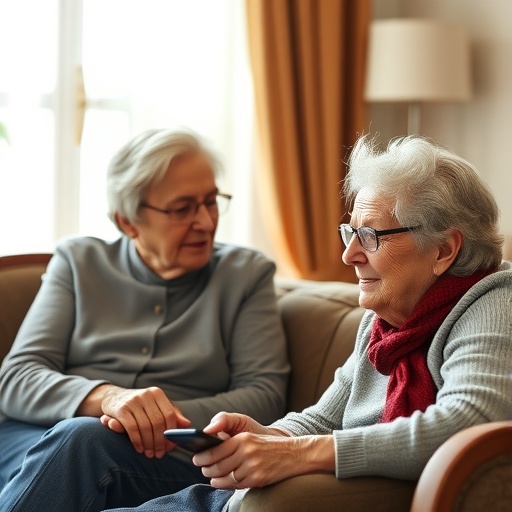In a groundbreaking study, researchers have shed light on the urgent issue of social alienation among elderly stroke patients, a demographic that often faces unique psychological and social hurdles. This condition, often overlooked in medical literature, can significantly impact recovery and quality of life. Despite the advances in medical treatments for strokes, the psychological dimensions of recovery remain inadequately addressed. The research, conducted by Lin et al., highlights the necessity of understanding social alienation and its implications for elderly stroke patients.
The phenomenon of social alienation is not merely a psychological state; it can manifest physically, exacerbating existing health conditions and hindering rehabilitation efforts. The study outlines various factors that contribute to feelings of isolation among older adults, including the loss of mobility, decreased social interaction, and the psychological aftermath of suffering a stroke. Understanding these factors is essential for healthcare providers and families alike, as it opens the door to more comprehensive strategies in rehabilitation and mental health support.
One of the most striking findings from the research is the interconnectedness of social alienation with other health-related issues, such as depression and anxiety. The study suggests that these mental health conditions are not just comorbid issues but are deeply entwined with the experience of social alienation. This finding stresses the importance of addressing mental health holistically in treatment plans tailored for elderly stroke patients. Interventions aimed at reducing feelings of loneliness and isolation could play a pivotal role in enhancing recovery outcomes.
Researchers employed various methodologies to delve deeper into the issue, utilizing both qualitative and quantitative approaches. By conducting surveys and interviews with stroke survivors, they gathered substantial data reflecting the emotional and social challenges these patients face. Their findings strongly indicate that a support system—ranging from family and friends to community resources—can significantly mitigate feelings of alienation.
Furthermore, the study emphasizes the role of healthcare systems in recognizing and addressing social alienation. Current protocols often focus on the physical recovery of stroke patients, neglecting crucial psychological assessments that could illuminate needs beyond medical intervention. By integrating assessments of social engagement and mental health into regular evaluations, healthcare providers can create more effective, personalized rehabilitation strategies that cater to the unique challenges faced by elderly stroke survivors.
The dynamic of aging also plays a critical role in the experience of social alienation. As individuals age, they may lose social ties due to the death of peers, limited mobility, or even relocation to care facilities. Lin and colleagues argue that such life transitions can precipitate or exacerbate feelings of isolation, necessitating proactive measures to foster social connections. The positive impact of community engagement initiatives, such as support groups and activities designed specifically for seniors, can be profound, potentially transforming solitary experiences into opportunities for connection.
Moreover, the technological advancements in communication present both a challenge and an opportunity. While the digital divide might exacerbate feelings of isolation, particularly among the elderly, technology can also serve as a bridge. Virtual support groups and social platforms can provide significant relief, connecting elderly stroke patients with their peers and creating a sense of belonging in a world that increasingly relies on digital communication. However, it is essential to balance technological integration without completely relying on it, ensuring that face-to-face interactions remain an integral part of social rehabilitation.
The study does not stop at delineating the problems; it also explores potential solutions and intervention strategies. Family members and caregivers play a crucial role in mitigating feelings of alienation. Training caregivers to recognize signs of social withdrawal and encouraging open communication can lead to timely interventions. The emotional labor of caregiving should not be underestimated, as families become the frontline support systems for recovering stroke patients. Thus, equipping them with knowledge and resources can foster an environment conducive to recovery.
In a broader sense, the implications of this research extend to public health policies that focus on elderly care. Policymakers must recognize social alienation as a significant public health issue, advocating for community resources that foster inclusion and support for vulnerable populations. This realization could initiate a shift in how society addresses aging and health, moving towards a more integrated approach that combines both medical care and social support.
As the research highlights, there is much work to be done in furthering our understanding of the elderly population’s unique challenges, particularly in the wake of stroke. The study emphasizes the importance of continued research in this area, encouraging further exploration into both the psychological and social aspects of recovery. Ultimately, embracing a more comprehensive framework for recovery could lead to innovations in treatment that drastically improve the lives of elderly stroke survivors.
It is crucial for this research to spark conversations among healthcare professionals, family members, and policymakers alike. Only through collective awareness and proactive strategies can we begin to address the alarming prevalence of social alienation among elderly stroke patients. It is a call to action that resonates beyond the scope of academia, demanding a societal shift towards understanding and empathy for those grappling with the consequences of age and illness.
In conclusion, the intricate web of social alienation and elderly stroke recovery poses a complex challenge that warrants immediate attention. The findings from Lin et al. not only illuminate the difficulties faced by this demographic but also provide a framework for addressing these issues head-on. By fostering a culture of support and understanding, we can enhance the quality of life for elderly stroke patients, ensuring that they are not alone in their journey towards recovery.
Subject of Research: The impact of social alienation in elderly stroke patients and the factors influencing it.
Article Title: Potential profiling of social alienation in elderly stroke patients and study of influencing factors.
Article References:
Lin, K., Ma, Y., Guo, X. et al. Potential profiling of social alienation in elderly stroke patients and study of influencing factors. BMC Geriatr 25, 899 (2025). https://doi.org/10.1186/s12877-025-06540-1
Image Credits: AI Generated
DOI: https://doi.org/10.1186/s12877-025-06540-1
Keywords: Social alienation, elderly, stroke patients, mental health, rehabilitation, public health, caregiver support, community engagement, technology.




